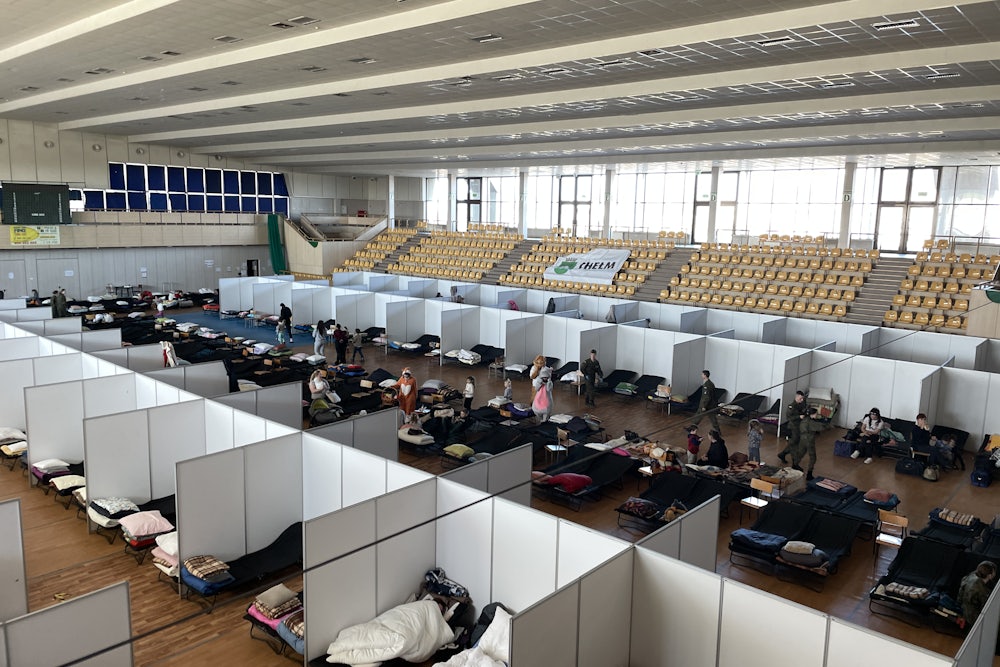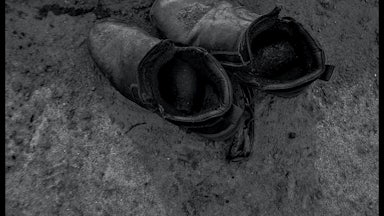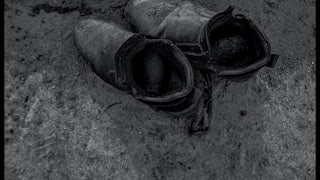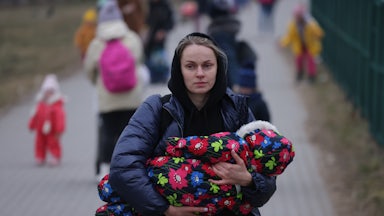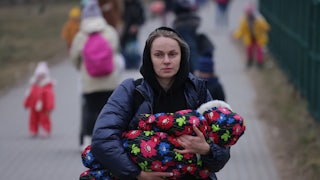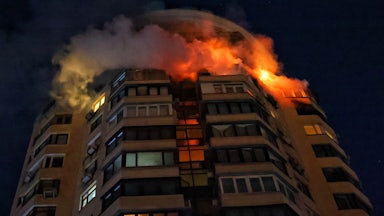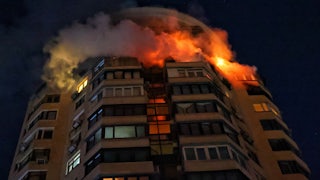“I’m looking for accommodations for Natalia, 41, with a dachshund and a cat. Will your pets manage?”
Sitting in a small room tucked away in the corner of a Warsaw office building, Zofia Jaworowska is on the phone with someone who had registered to host Ukrainian refugees in their home. It’s the end of March, and she’s putting in a shift at Grupa Zasoby, or Team Resources, a volunteer organization that she helped found more than a month earlier, after the Russian invasion of Ukraine began. She’s trying to find a place for Natalia, a new arrival.
It takes some doing, but after several tries, Jaworowska, 30, succeeds in making a match. She does a little celebratory dance in her chair, and makes a note in the group’s database. “Natalia will be with you guys for three days,” she says into her earbud mic.
For weeks, Grupa Zasoby has tirelessly puzzled out how to accommodate thousands of Ukrainian refugees arriving in Warsaw. There are numerous details to tend to. The volunteers have to make sure that someone with a cat allergy doesn’t get placed in a home with pets, or that the hosts will be OK with a 4 a.m. wake up call to make sure that their guests, a four-generation family, make a train to their next destination. The group had 6,000 hosts in their database and nearly 200 volunteers to help make the arrangements. They received nearly 18,000 requests for help and successfully placed more than 5,500 people in temporary housing.
In the three hours I spent there, observing their work, they found beds for over 40 people in private homes, hostels, hotels, and even a gym in a luxury apartment building that its residents have transformed into a shelter. This was a slow day—there’s a smaller need for short-term housing than at the height of the exodus. But more importantly, fewer hosts are picking up the phone, evidence of the strain that the refugee crisis is having as the war drags on.
“We had many more places to choose from earlier on,” said Magdalena Kubicka, another one of the group’s leaders. “Now you call, and they either already have someone at home or they are tired because they took people in a dozen times already.” Warsaw’s population increased by 17 percent in the three weeks since the beginning of the war, according to city authorities. Kubicka, 30, arrived at Grupa Zasoby after she clocked out at her day job in customer support at a fashion brand at 4 p.m. That meant she had a 15-minute break before heading to the Zasoby office for her shift, which would end late at night. That’s another place where the pressure of the prolonged crisis is starting to appear: You can’t function this way for long, burning the candle at both ends.
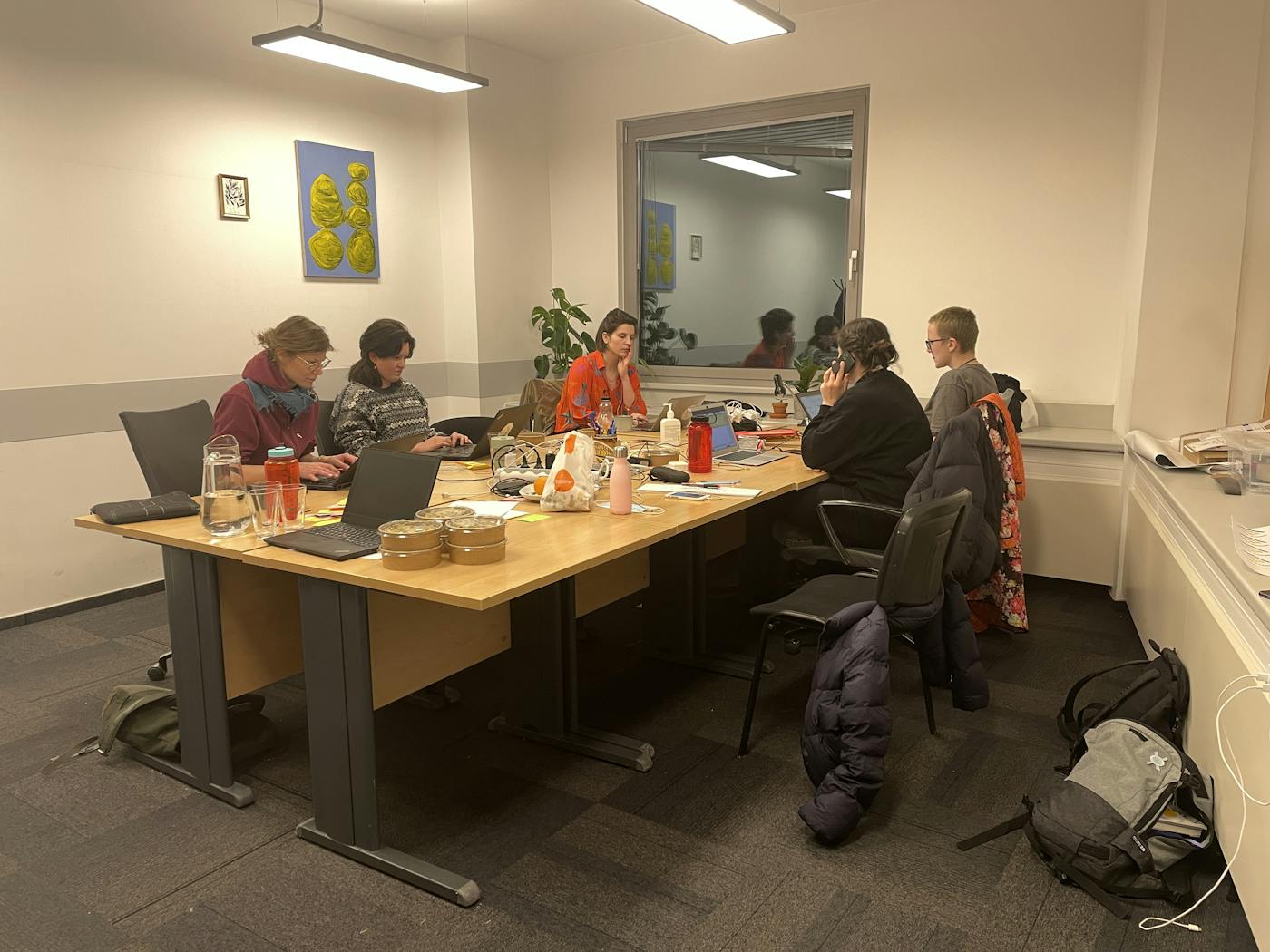
Sure enough, “Zasoby,” as it came to be known, closed its operations at the end of March. The completely grassroots operation was not sustainable, partly because of housing in Warsaw becoming saturated and partly because it’s impossible to keep up the necessary volunteer energy. But thousands of refugees are still arriving in Poland’s capital and other Polish cities: In early April, between 18,000 and 25,000 people were crossing into Poland from Ukraine on a daily basis, according to the country’s border agency. The reception points at train stations—many of them also volunteer-run and supplied—are posting increasingly desperate appeals on social media asking their followers to deliver bottled water, food, and baby lotion for the newcomers.
The Polish refugee relief effort has been an enormous feat. According to a poll from mid-March, nearly 70 percent of Poles have been somehow involved in helping to provide refuge for those fleeing the violence. But the war is not abating, and it’s clear that many of the refugees will need to remain in the country indefinitely. Beyond issues with immediate accommodations, experts are very concerned about the country’s capacities as it prepares to absorb this new population—the vast majority of whom are women and children—in just about any respect, whether it’s housing, jobs, schooling, health care, or societal attitudes. Poland’s social safety net is less robust than other European states’, and its immigrant integration policies are far from ideal.
Perhaps the best way to grasp the scale of the grassroots volunteer operations in Poland is to spend time on Polish social media, where many have been coordinating the undertaking. Just two days after Russia’s invasion, people on my Instagram feed were looking for big, zippered bags to pack supplies “for the boys at the front.” My former high school teacher organized an art sale for the Ukrainian army, and an elementary school friend who’s now a chef asked people to donate cheese, ham, and cucumbers for sandwiches for the newly arrived.
Every day social media feeds are jammed with people seeking housing for refugees: One day it’s someone seeking shelter for two women and their children; the next it’s for an elderly person in a wheelchair; log in later, and now it’s a family in transit that needs a place to stay. Someone tagged Netflix to request a free subscription to screen children’s movies in Ukrainian at a makeshift daycare center they organized on the spot. Someone else posted about free therapy for the refugees and special workshops for the hosts. Fairly early on, many of those involved started moving beyond mere temporary relief, offering full-time jobs for the displaced; coordinating schooling for the children. Most of this assistance came from regular people, everyone pitching in any way they could.
“At least you have a feeling of doing something, anything, when the enormity of the situation is unimaginable,” said Maria Nowak, 30, who hosted four different families from the beginning of the war in her Warsaw apartment, which she shares with her husband and 6-month-old son. The latest group is a 23-year-old mom with a 2-week-old with hepatitis, a 16-month-old, and a 16-year-old sister.
The Poles I spoke to didn’t have to think twice before mobilizing to help Ukrainians. The two nations are inextricably intertwined by a complex, centuries-long history. For Poles, colonial Russian oppression is deeply, painfully familiar—as is the destruction happening right outside their border. Cities that are less than a day’s drive from their own being razed to the ground; women and teenagers heading off to fight the invasion: These images immediately dredge up the stories they grew up hearing, the tales of their own grandparents—civilians who took up arms during World War Two. Online, Poles share a meme that juxtaposes photos of Mariupol, destroyed by the Russians in 2022, and Warsaw, obliterated by the Nazis in 1945. “Those memories are very much alive, in the monuments we’re surrounded by, the books we’re assigned at school,” said Daria Głowacka, 33, who took in a mother and her 5-year-old daughter into her fairly small apartment in Łódź, a city in central Poland.
Unlike Ukraine, Poland benefits from NATO’s safety guarantees, as well as the tremendous economic boost provided by its membership in the European Union. Today, many Poles are using the spoils of their country’s successful economic transformation and many years of injections of Western cash to help needy Ukrainians: donating money and offering up their second homes or EU-funded community centers as shelter. They also know many of those arriving and their families personally. Ukrainians have been part of the fabric of Polish society for many years now, whether it’s students who’ve come to study at Polish universities or those acting as Poland’s blue-collar labor force, working temporary jobs at construction sites, cleaning homes, and driving Ubers.
“I keep thinking that a free Ukraine is a free Poland, and we must do everything we can for these people to feel comfortable here,” Głowacka said.
While Poles have been glad to help, the effort has created an undeniable strain. Many have taken time off work; others have completely suspended their businesses to take on the crisis full-time. Jacek Radkowiak’s construction company is on hold while he manages a warehouse with humanitarian aid for Ukraine in Chełm, a midsize town just 15 miles from the border. He’s volunteering 12 hours a day—but he’s done some shifts that have lasted 26 hours straight.
“As long as I can manage emotionally, physically, and financially, I’ll stay and help,” he said. “But as they say, to be able to help, you need something in your own bank account.”
“It’s really starting to get dicey,” said Robert Górnik, a local entrepreneur who helped launch a privately run reception center at a former car repair shop, which can house up to 130 people a night. “At first, the laundromats would launder the sheets we needed for free; caterers wouldn’t charge for food. That’s starting to end. We need to find financing, because people are still coming,” Górnik said.
Poland’s volunteers haven’t shouldered the burden alone. Local, town, and city-level governments have been instrumental to the endeavor. Coordinating the Chełm humanitarian relief is the town’s sanitation agency, as well as the local authorities that run the largest reception centers, which over the last few weeks have become well-oiled machines. (At one, the new arrivals get paper bracelets with Q.R. codes and data privacy notices to go with them, all to ensure they leave on their own accord or with vetted drivers.)
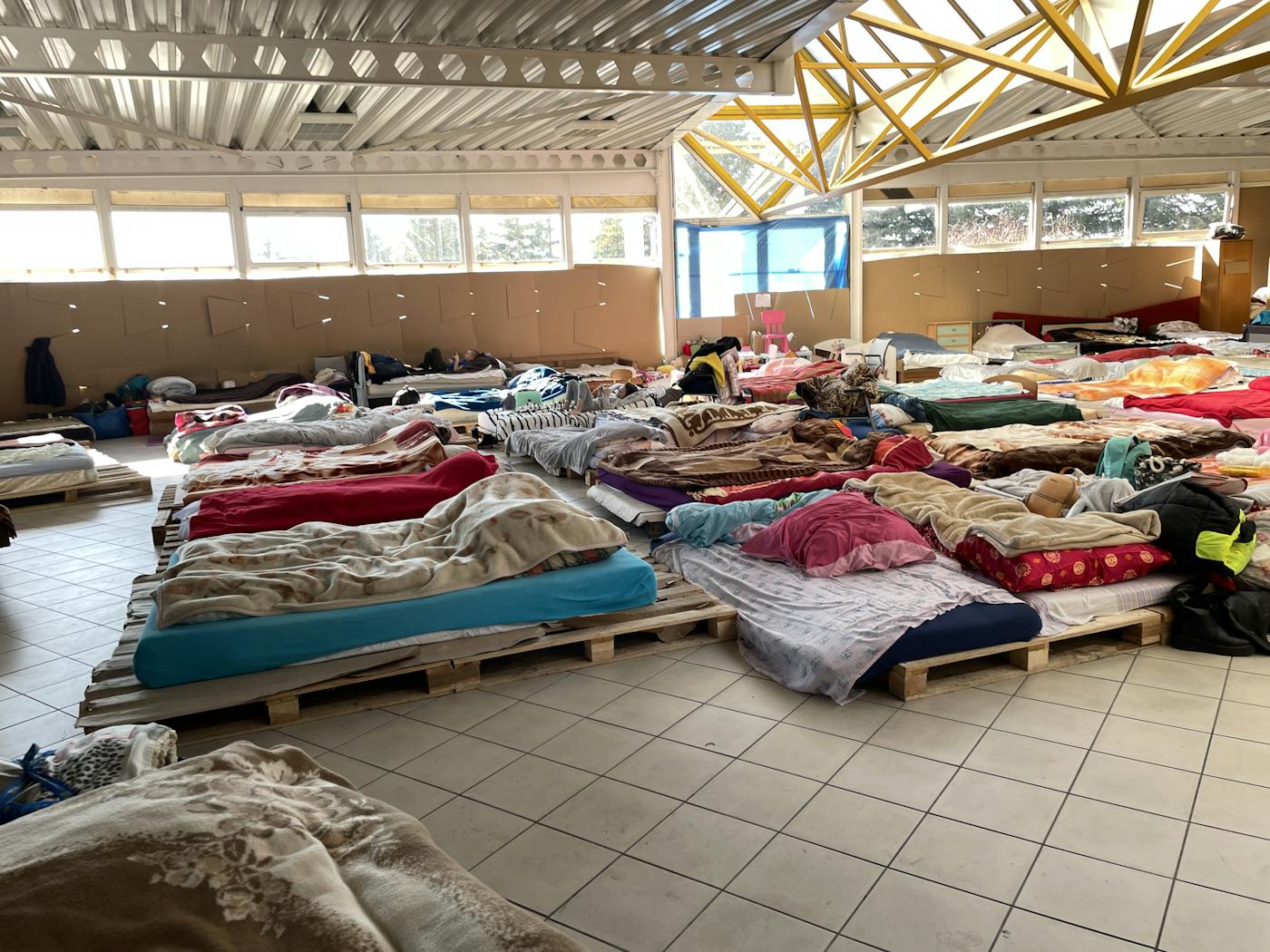
But throughout the crisis, those involved on the ground have been repeating: Where is the government, and why is it taking credit for the actions of private citizens? “Those working on the grassroots level don’t see coordinated, long-term efforts that could relieve them,” Górnik said.
To a certain extent, this is par for the course, experts say. Regular people always react faster, and local organizations tend to be much more nimble than massive bureaucracies. “This is normal; this happens all around the world,” said Dominik Wach, a political scientist at Warsaw University’s Centre for Migration Research and former humanitarian aid worker in the Middle East. It takes time for the larger, national or international-level mechanisms to start working.
And it’s not that the government has been completely absent. Regional authorities, which are branches of the central government, have been managing some of the shelter spaces and transit hubs. On March 9, parliament passed a law regulating some of the relief operations, providing financial help for those hosting refugees, and introducing several integration mechanisms, such as extending the country’s social safety net to the refugees.
But many say this is all too little, too late. The government-run shelters are still staffed largely by volunteers. They are often in huge, empty spaces, like expo halls or local community centers, with hundreds of cots lined up next to each other—conditions that are inadequate for long stays. There have been problems with sanitation and disease. The per-night payments the government allocated to the private facilities housing larger groups of refugees quickly proved insufficient in many locations. The benefits offered to refugees do not apply to many non-Ukrainian nationals who’ve fled the same war.
What’s more, the refugees who are arriving in Poland now have fewer resources, connections, and plans than those who fled in the first days of the invasion. Many are coming from areas that have been ravaged by the war. A family of four who managed to escape from besieged Kharkiv in eastern Ukraine—parents, a 25-year-old son, and his 22-year-old wife—arrived at a reception center in Warsaw on March 30. They were counting on finding jobs first and housing later. Svetlana, 46, was a salesperson at an open-air market back home, while her husband, also 46, worked at a tire repair shop.
As Poland moves into the second phase of the crisis, it’s an open question about whether the country will be able to handle the long-term needs of those who have fled Ukraine. This is where the government’s role will be critical.
“The vast majority of those who’ve come to Poland will stay,” said Jan Grzymski, assistant professor at Warsaw University’s Centre for Migration Research. The latest estimates put the number of those who’ve remained in Poland between 1.3 and 1.5 million. Even if the war were to end soon, many of those who fled Ukraine won’t have a home to return to. It’s also difficult to convince many Ukrainians to go further westward into the EU. There are a number of reasons for their reticence. Some simply don’t want to stray too far from Ukraine. There’s already a large Ukrainian diaspora in Poland that can serve as a support system. And the Polish language is close enough to Ukrainian and Russian that the refugees can easily communicate with the locals.
Katya, 37, was the head of a radiology department of a hospital in Kyiv, where she says she led a very comfortable life. She speaks English, has traveled to medical conferences in Western Europe, and has had job offers in Germany and in the Netherlands. But she’s staying in Warsaw. People approach her and her 11-year-old daughter in Polish, assuming they are local. They blend in: The history, the language, the culture all feel familiar. One of Katya’s favorite books growing up was a classic of Polish historical fiction, Henryk Sienkiewicz’s With Fire and Sword (whose romantic plot is a love triangle involving a Polish noblewoman and a Cossack warrior). “We feel that we are not strangers in this country,” she said.
Katya is upfront about not planning on returning to Ukraine anytime soon. She says she has to think of her daughter’s future. “I just can’t feel safe,” she said.
Thanks to her résumé, she managed to land two part-time positions in her field. But even Katya, with more resources than many, with her job experience, language skills, and a very engaged and well-connected host, was unable to find long-term housing on the open market in Warsaw.
“Either prices are really high or there is nothing to rent,” said Magdalena Koczkowska, Katya’s host. They only managed to find a small apartment through a friend of a friend. Rents in Warsaw rose 15 percent in the first two weeks of the war—in Kraków 26 percent and in Wrocław 33 percent, according to one analysis.
Głowacka has a spreadsheet of 389 apartment listings that she used to make inquiries when she was trying to find a place for her guests in Łódź. The landlords she spoke to expressed myriad concerns, including worries that they’d struggle to communicate with Ukrainian tenants, fears that the tenants wouldn’t be able to reliably pay, or that they’d break a lease early to return home. Others set prohibitive rents or required proof of full-time, indefinite employment—an insurmountable hurdle for many refugees.
Jobs will likely be another massive problem. Employers are optimistic that Poland needs workers and that the country will be able to seamlessly absorb many newcomers, Wach said. But that ignores the fact that many of the Ukrainian refugees are either elderly or are effectively single mothers who also have to take care of their children. “It’s not going to be the kind of Ukrainian migration Poland saw before, when young men would come to work temporary jobs and live very cheaply in worker hotels or by splitting the cost of a single room with other guys.”
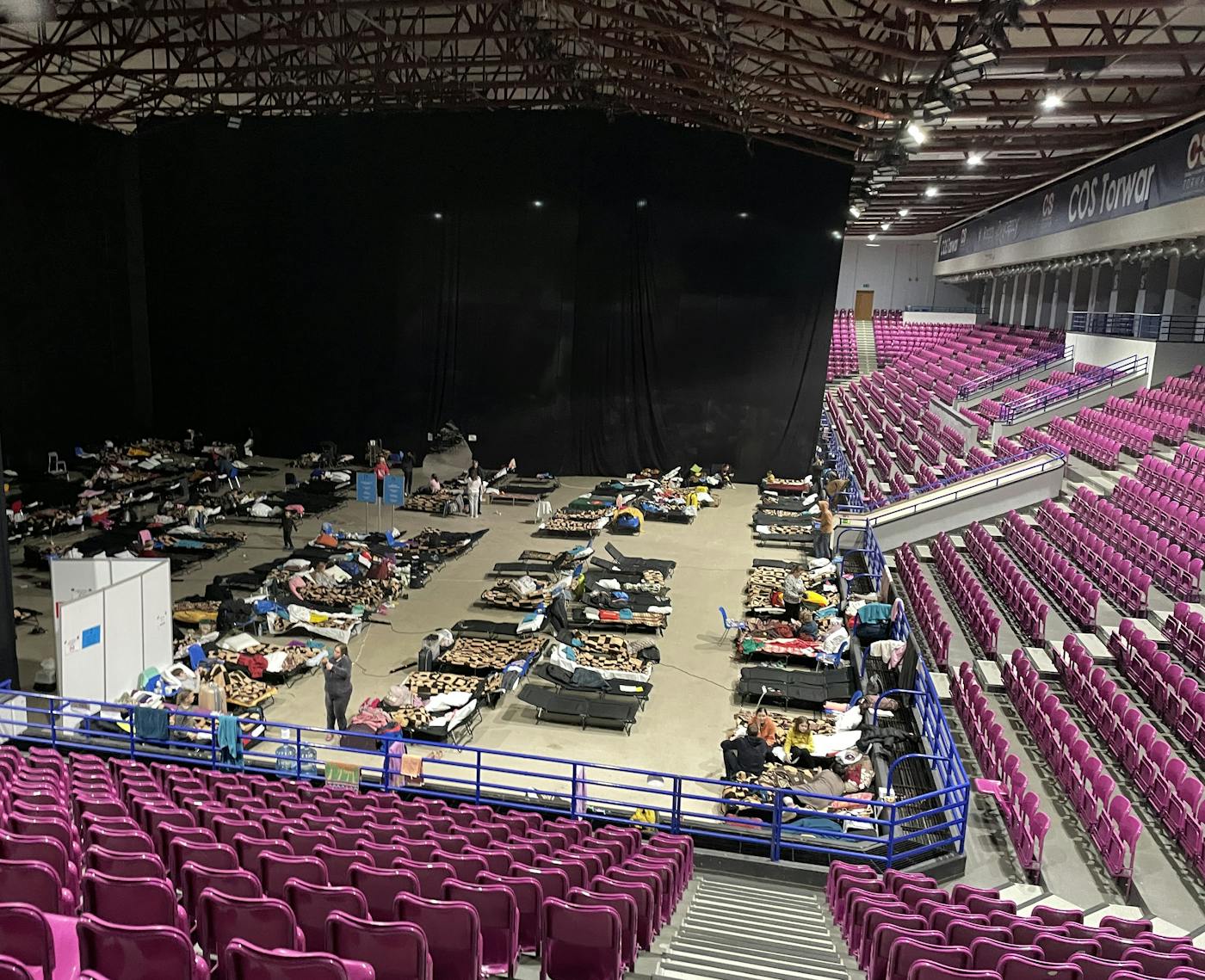
And that’s just the beginning of the challenges to come. The health care system in Poland is already inefficient, and now it will have to admit hundreds of thousands of new patients. Many Ukrainian kids are already attending Polish schools—one estimate said that already 7 percent of Warsaw’s elementary school kids are Ukrainian refugees. These are children who come from a completely different education system, who don’t speak the language, many of whom are traumatized.
“What we need is broadly defined social work, a system to help these people rebuild their lives in this very difficult new situation,” said Wach. And Poland doesn’t have the necessary cadres of social workers—let alone ones who are decently paid and trained to work with foreigners.
“Germany saw a million newcomers [during the migrant crisis of] 2015–16, but over a longer period, and even they had enormous problems in the beginning to manage it all,” said Wach. “And when it comes to public policy, that’s one of the best-organized countries in the world.”
“We’re talking about Ukrainian refugees staying in Poland for a year or longer, and that requires a swift and radical rethinking of what Poland’s integration policy should look like,” said Grzymski. “And to be honest, I don’t feel like the government is seriously looking at this.”
One way at least to mitigate the problems would be to ask for outside help, whether to deal with the most pressing problems, like receiving the refugees, or more long-term solutions. But so far, this has proven to be a thorny question for the nationalist government in Warsaw.
“The government has delegated tasks to local authorities,” said Rafał Kostrzyński, spokesperson for the United Nations High Commissioner for Refugees in Poland, which is coordinating plans to support countries bordering Ukraine in various ways. “The scale of our operations and how we help is dependent in large part on the government.… We cannot decide when and how we’ll help unless we come to an agreement with the Polish authorities.”
So far, that outside help has largely been financial. UNHCR has set up a large cash assistance program directly for the refugees. The government has also reportedly asked the EU for some funding. It has not requested, however, help with relocating the refugees to other European states. The Polish Ministry of the Interior and Administration, which coordinates the government’s refugee response, did not respond to a list of questions.
Poland is taking the attitude of a “proud, sovereign nation” that can handle the situation, Grzymski said. Politically, asking for help with relocation would be tricky at best—after all, the same government , during the 2015–16 crisis, blocked proposals to relocate refugees and migrants from Africa and the Middle East to Poland, from EU countries that saw the biggest influx at the time.
In fact, the party that now governs Poland, the right-wing, populist Law and Justice, centered its 2015 electoral campaign around the refugee issue. The party’s leader, Jarosław Kaczyński, used racist rhetoric about dangerous “diseases” and parasites appearing in Europe during that migrant crisis and stoked fears about “sharia law.”
And therein, in the decisions that clearly show whom the Polish government deems worthy of help, lies a key crack in the narrative of the heroic Polish refugee effort. That mindset continues to this day.
In the borderland woods just several hundred miles to the north of where the refugees from Ukraine are being greeted as “guests,” people who fled Syria, Yemen, Iraq, or Afghanistan are stuck in a geopolitical limbo, bandied between the Polish and Belarusian border guards. Poland tries to prevent them from requesting political asylum in the country, arguing that the asylum-seekers are instruments of Belarusian propaganda, aimed at making Poland look bad. They push the migrants back to Belarus, where some of them have reported being tortured.
The situation is flaring up again now that winter has given way to spring, with more people trying to cross over into Poland, including families with small children and people with disabilities. More than a dozen migrants have died since the crisis started last summer. Poland has made that part of its border a militarized zone, detaining journalists reporting on what’s going on and those who are trying to deliver aid to the people camping out in the forests in terrible conditions.*
Poles have been divided over the issue of these so-called “pushbacks.” Legions of ordinary citizens were also involved in efforts to help those in the borderland woods, including all of those hosting Ukrainian refugees in their homes whom I spoke to for this story. Many are fuming at the racist double standard now set by the government.
“I went to the Ukrainian border to audit the reception system, and I couldn’t believe that there were tents with food, doctors, and that the border guards and other authorities were helping the Ukrainians carry their luggage,” said Marta Górczyńska, lawyer with the Helsinki Foundation for Human Rights and the NGO collective Grupa Granica. “I forgot that you can treat people who are running away from something and are scared with such empathy and kindness.”
But at the height of the crisis, last October, 46 percent of Poles supported the pushback policy. What’s more, experts and activists warn that dividing refugees into “better” and “worse” ones will come back to haunt Poland—especially when so much of the burden of the Ukrainian refugee relief effort is on regular people.
Ukrainians may be the ones who’ll pay the price. Before the war, anti-Ukrainian behaviors among Poles were not uncommon, and there have already been instances of hostile attitudes toward those fleeing the war with Russia.
“The government stoked fears of refugees, ‘foreigners,’ those who need our help,” Górczyńska said. “This unfortunately can be transferred onto any person who comes here looking for help and protection.”
* This article has updated to clarify how journalists are being treated in Poland.
